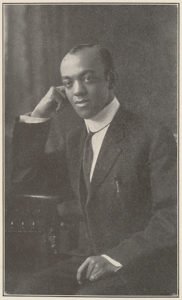
Fenton Johnson
*This date marks the birth of Fenton Johnson, a Black poet and writer, in 1888.
He was the nephew of Eudora Johnson and Jesse Binga. He published his first poem from Chicago, Illinois, at age twelve. His plays were performed in a Chicago theater when he was just nineteen.
Johnson was educated at the University of Chicago, Northwestern, and Columbia University. Johnson was married to Cecilia Rhone. He was a member of the Authors League of America and the Alpha Phi Alpha Fraternity. He worked as a journalist for the Eastern Press Association and New York News while continuing to produce published poetry. After returning to Chicago, he made two short-lived periodicals, Champion and Favorite Magazine.
Johnson's early work contains poems written in Black dialect and conventional English. His material reveals the influence of traditional spirituals and the poetry of Paul Laurence Dunbar. Johnson's poems are a significant bridge between the work of turn-of-the-century authors and the writers that would constitute the Harlem Renaissance in the 1920s and 30s. His later poems reveal a determination yet pessimism related to the urban blues of the same period. After 1920, Johnson's literary activities dropped considerably. Although he continued to write poems into the 1930s, he published very little in his later years.
Johnson's books of poetry include A Little Dreaming (1913), Visions of the Dusk (1915), and Songs of the Soil (1916). He also published an essay, For the Highest Good (McGrath, 1969), and a collection of stories, Tales of Darkest America (Books for Libraries, 1971). Critics have often characterized Johnson's poetry as characterized by great irony and a kind of hopelessness resulting from an embattled African American experience. Fenton Johnson died in September 1958.